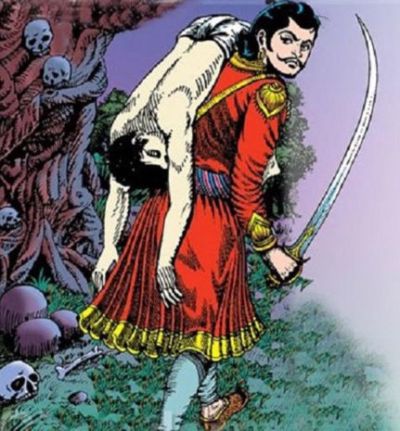“The fourth however, saw that the result was a body of a lion. He knew the dangers of making that lion come to life…”
“Yet, just because he wanted to show off his skills, he made it to come alive, and to disastrous consequences. Not only did he kill the others, but he too died in the process.”
Hence, the mistake that he committed, was the gravest.”
As the king uttered these words, the Vetāla flew off his shoulder, laughing. And King Vikram once more started to walk towards the banyan tree, determined to fetch him.

त्रयोिवशंो वतेालः
The twenty-third story
The sanyasi who first wept, and then danced
ततो गत्वा पुनः प्राप शिंशपापादपात् ततः ।
स त्रिविक्रमसेनस् तं वेतालं राजसत्तमः ॥ १२,३०.१ ॥
स्कन्धे कृत्वा च तं मौनी दर्शितानेकवैकृतम् ।
यावत् प्रतिष्ठते तावत् स वेतालस् तम् अब्रवीत् ॥ १२,३०.२ ॥
राजन्न् अकार्ये ऽप्य् एतस्मिन् दुर्वारो ऽयं ग्रहस् तव ।
तत् ते श्रमविनोदाय कथयामि कथां शृणु ॥ १२,३०.३ ॥
King Vikram went back to the tree, and bringing down the Vetāla, placed him across his shoulders and started to walk back.
As the king walked in silence, the Vetāla spoke from his shoulder.
“Oh king! This task is beneath you, and not at all representative of your unlimited capabilities. Yet you demonstrate excellent perseverance in it, and so, here is a story to dispel your fatigue.
आसीत् कलिङ्गविषये नाम्ना शोभावती पुरी ।
दिवीव शक्रनगरी वसतिः शुभकर्मणाम् ॥ १२,३०.४ ॥
यां प्रद्युम्न इवैश्वर्यवीर्यातिशयविश्रुतः ।
प्रद्युम्ननामा नृपतिः शशासोर्जितशासनः ॥ १२,३०.५ ॥
गुणापकर्षश् चापेषु मुरजेषु कराहतिः ।
युगेष्व् अश्रूयत कलिर् यस्यां प्रज्ञासु तीक्ष्णता ॥ १२,३०.६ ॥
एकदेशे पुरस् तस्या नृपेण प्रतिपादितः ।
यज्ञस्थलाभिधानो ऽभूद् अग्रहारो बहुद्विजः ॥ १२,३०.७ ॥
तत्रासीद् यज्ञसोमाख्यो ब्राह्मणो वेदपारगः ।
महाधनो ऽग्निहोत्री च पूजितातिथिदेवतः ॥ १२,३०.८ ॥
तस्य व्यतीते तारुण्ये मनोरथशतैः सुतः ।
भार्यायाम् अनुरूपायाम् एक एवोदपद्यत ॥ १२,३०.९ ॥
ववृधे च पितुः सो ऽस्य गृहे बालः सुलक्षणः ।
कृताभिधानो विधिवद् देवसोम इति द्विजैः ॥ १२,३०.१० ॥
प्राप्तषोडशवर्षश् च स विद्याविनयादिभिः ।
आवर्जितजनो ऽकस्माज् ज्वरेण प्राप पञ्चताम् ॥ १२,३०.११ ॥
ततः परासुं स्नेहात् तम् आश्लिष्य सह भार्यया ।
यज्ञसेनः पिता शोचन् न दाहाय जहौ चिरम् ॥ १२,३०.१२ ॥
In the faraway land of Kaliṅga, is a city named Śobhāvatī. This city was magnificent, and rivaled the city of Indra, and was populated by all righteous people.
Śobhāvatī was ruled by King Pradyumna, whose fame was spread far and wide, and like the Deva Pradyumna, was known for his might and valor.
In Śobhāvatī…
गुणापकर्ष (the stretching or ‘decline of a string) was in the string of a bow, and not in the character (गुण also means character) of it’s subjects,
कराहति (beating of hands) was on drums and not taxes (कर also means taxes) levied on it’s subjects,
कलि was a Yuga and not deceit (कलि also means deception),
and तीक्श्णता (sharpness) was in intellect and not in words.
In the northern part of the city was Yajñasthala, a place that the king had granted to the Brāhmans of the kingdom. In Yajñasthala lived a wealthy Brāhman named Yajñasoma. He was a master of the Vedas, and led a pious life, by performing yagnās, and honoring his guests and the Devās.
In the course of time he got married and born to him was a son of excellent qualities, one that he named Devasoma.
When Devasoma became sixteen years of age, that boy, who had captivated everyone’s hearts with his knowledge, modesty and good qualities, suddenly caught a fever and died.
Yajñasoma was shattered, and along with his wife, embraced the dead body of his son, their tears refusing to stop, and both were unwilling to let the others take away the body to be cremated.
The elders assembled there observed this for a while, and then called Yajñasoma and said…
to be continued…
